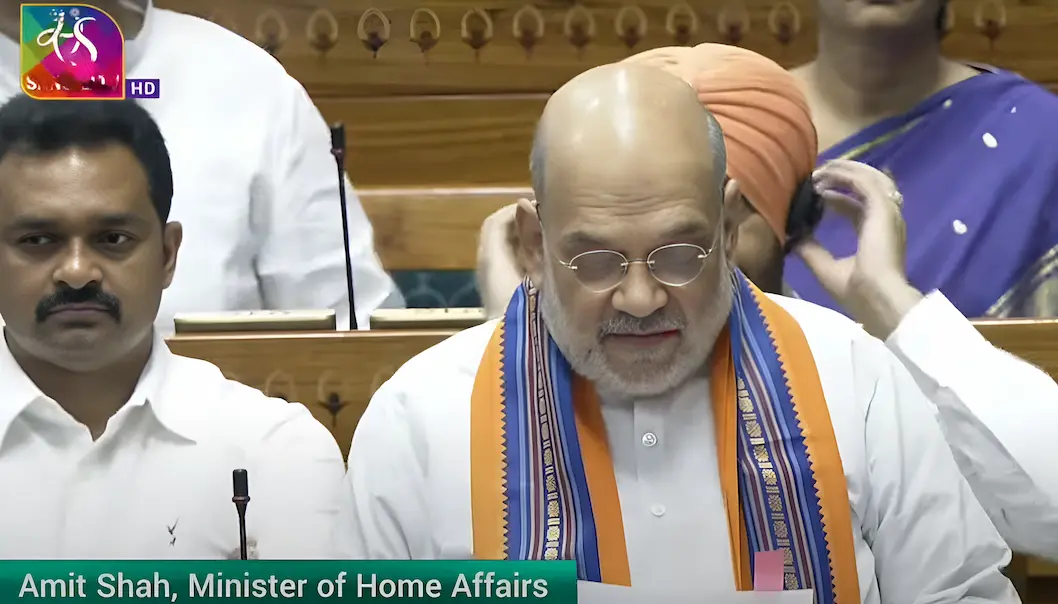
Modi govt introduces bills to stop jailed leaders from serving as PM, CM, or ministers. (videograb Sansad TV)
Jailhouse Governance Ends? India’s political landscape may be on the brink of a historic transformation. In a bold move to uphold moral standards and restore public trust, three constitutional amendment bills have been tabled in the Lok Sabha with the Speaker’s permission. These bills, backed by the Modi government, seek to prevent individuals who are incarcerated from holding key constitutional positions such as Prime Minister, Chief Minister, or Union/State Minister.
Table of Contents
This legislative push comes amid growing public resentment over political figures continuing to govern from jail, a phenomenon that has sparked outrage and raised serious questions about ethics, accountability, and the sanctity of democratic institutions.
The Moral Crisis: Why These Bills Matter Now
India’s Constitution was crafted with the vision of a just, transparent, and morally upright democracy. But recent years have seen a troubling shift. Political leaders arrested on serious charges have refused to resign, choosing instead to run governments from behind bars. This defiance of moral accountability has not only eroded public trust but also exposed a glaring loophole in the legal framework.
The newly proposed bills aim to close that loophole by enforcing three key regulations:
- Disqualification While Incarcerated: Any individual arrested and lodged in jail will be barred from functioning as Prime Minister, Chief Minister, or Minister.
- Mandatory Bail Timeline: Accused politicians must secure bail within 30 days of arrest. Failure to do so will result in automatic disqualification from their post.
- Reinstatement Only After Bail: Leaders may be reinstated only after obtaining bail through due legal process, ensuring that governance is not compromised by legal entanglements.
This legislative initiative is not just about legal reform—it’s a moral reckoning. It sends a clear message: public office is a privilege, not a shield against accountability.
Jailhouse Governance Ends? Running Governments from Jail: A Troubling Trend
The bills are a direct response to a series of high-profile cases where ministers and chief ministers continued to wield power from jail. These instances have sparked national debate and international scrutiny.
In one case, a state leader facing serious corruption charges refused to step down, issuing directives from prison and maintaining control over party machinery. Such actions blur the line between legal rights and ethical responsibilities, undermining the very foundation of democratic governance.
Critics argue that allowing jailed leaders to govern sets a dangerous precedent. It normalizes criminality in politics and sends a message that power can be retained regardless of legal status. Supporters of the bills believe this is a necessary correction, a way to realign politics with public expectations and constitutional values.
Legal, Ethical, and Political Implications
The proposed amendments raise important questions about the balance between legal rights and political ethics. While every citizen is presumed innocent until proven guilty, the responsibilities of public office demand a higher standard.
Legal experts have weighed in, noting that the bills do not violate fundamental rights but rather establish eligibility criteria for holding office, similar to existing disqualifications based on conviction. The 30-day bail clause is seen as a reasonable timeframe that respects due process while ensuring timely resolution.
Political analysts suggest that the bills could reshape electoral dynamics. Parties may be forced to rethink candidate selection, prioritizing clean records and public trust over charisma or vote-bank appeal. This could lead to a healthier political culture, where integrity is valued as much as influence.
Public sentiment, as reflected in social media and opinion polls, appears to favor the move. Citizens are increasingly vocal about their desire for clean governance and accountability. The bills tap into this sentiment, offering a legislative solution to a moral crisis.
The Road Ahead: Public Debate and Parliamentary Scrutiny
As the bills move through parliamentary channels, they are likely to face intense debate. Opposition parties may challenge the timing, intent, or specific provisions, arguing that the amendments could be misused for political vendetta. Civil society groups may call for broader reforms, including transparency in candidate backgrounds and stricter enforcement of existing laws.
Yet, the core question remains: Should individuals in jail be allowed to govern?
This is not just a legal issue, it’s a societal choice. The bills invite citizens to reflect on the kind of leadership they want, the values they uphold, and the future they envision for Indian democracy. If passed, these amendments could mark a turning point in Indian politics, a shift from power-centric governance to principle-driven leadership. And in doing so, they may finally answer the question that has haunted the nation for years: Can morality and politics coexist?